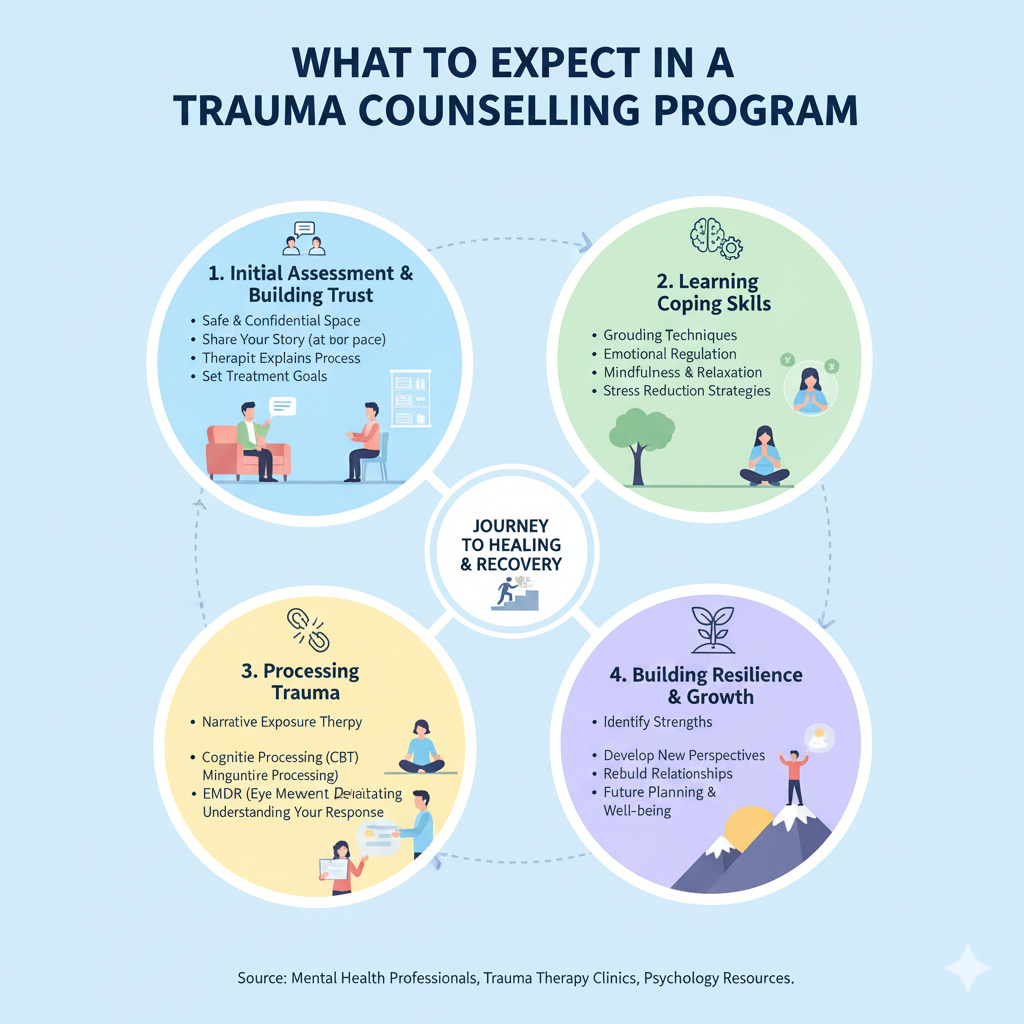Trauma Counselling Programs That Promote Recovery and Growth
Introduction
Experiencing trauma can leave deep and lasting imprints on both mind and body. Whether the event was recent or occurred years ago, its effects may continue to shape emotions, thoughts, and behaviours. Feelings of fear, helplessness, or shame often linger, making daily life more challenging. Trauma counselling offers a safe path forward. By working with trained professionals, individuals can process their experiences, reduce distress, and begin to rebuild a sense of safety and trust.
Across the world, and increasingly in Singapore and other regions, structured trauma therapy programs are designed not only to address painful memories but also to support long-term recovery and growth. This article explores the approaches, benefits, and importance of trauma-focused counselling, with practical insights for anyone seeking guidance.
Understanding Trauma and Its Impact
Trauma can arise from many experiences, such as accidents, abuse, natural disasters, loss, or prolonged stress. Its effects vary widely, but common symptoms include:
Flashbacks or intrusive memories
Avoidance of reminders related to the trauma
Emotional numbness or detachment
Hypervigilance and heightened startle responses
Sleep disturbances and nightmares
Persistent anxiety, guilt, or anger
When these symptoms persist, they can disrupt work, relationships, and health. Trauma is not just “in the past.” Without support, its weight can affect how individuals feel about themselves and the world around them.
What Is Trauma Counselling?
Trauma counselling is a form of therapy specifically designed to help individuals process and recover from distressing experiences. Unlike general counselling, it acknowledges the ways traumatic events impact both psychological and physical wellbeing. The process focuses on:
Creating a safe and supportive environment
Helping clients process traumatic memories at their own pace
Developing skills to manage triggers and emotional reactions
Strengthening resilience for future challenges
By engaging in trauma-focused counselling, individuals can regain control of their lives and build healthier connections with themselves and others.
Approaches in Trauma Therapy
There is no single method for trauma recovery. Different therapeutic models are applied depending on the individual’s needs, comfort level, and goals. Some of the most effective approaches include:
1. Cognitive Behavioural Therapy (CBT) for Trauma
CBT helps individuals recognise and reframe unhelpful thought patterns connected to the traumatic experience. This structured approach provides coping skills to manage flashbacks and intrusive thoughts.
2. Eye Movement Desensitisation and Reprocessing (EMDR)
EMDR is widely used for trauma therapy. It involves guided eye movements or other bilateral stimulation techniques to reduce the intensity of traumatic memories, helping the brain reprocess them in a less distressing way.
3. Somatic Therapy
Since trauma can live in the body, somatic therapy focuses on physical sensations. Breathing exercises, grounding techniques, and body awareness help clients release tension and restore calm.
4. Trauma-Focused Cognitive Therapy (TF-CBT)
Designed for both adults and children, TF-CBT combines elements of cognitive therapy with trauma-sensitive principles. It helps clients build trust and gradually process their experiences.
5. Group Trauma Counselling
Sharing experiences in a supportive group can reduce feelings of isolation. Group therapy fosters connection and validation among individuals who have faced similar challenges.
The Role of Trauma-Focused Counselling
Trauma-focused counselling recognises that recovery is not only about reducing symptoms but also about rebuilding identity and meaning. Clients are guided to explore their narratives, acknowledge their resilience, and find ways to reconnect with their strengths.
Sessions typically include:
Psychoeducation about trauma and its effects
Gradual exposure to difficult memories in a safe manner
Skills training in relaxation and emotional regulation
Exploration of strengths and positive coping strategies
This approach honours both the pain of the experience and the possibility of growth beyond it.
Benefits of Trauma Counselling
Engaging in trauma therapy offers far-reaching benefits that extend beyond symptom relief:
Reduced intensity of flashbacks and intrusive memories
Improved emotional regulation and sense of safety
Healthier relationships through improved communication and trust
Restored confidence in daily functioning
Greater self-understanding and acceptance
A renewed sense of meaning and purpose in life
Recovery does not erase the past, but it reshapes how the past is carried. With support, individuals can reclaim their sense of agency and rebuild hope.
What to Expect in a Trauma Counselling Program
For many, beginning trauma counselling can feel intimidating. Knowing what to expect may ease this concern. Typically, the process includes:
Initial Assessment – The therapist gathers information about symptoms, history, and goals.
Safety Building – Before addressing trauma directly, sessions focus on developing coping skills and creating a secure environment.
Processing – Clients gradually revisit traumatic memories, often with techniques such as EMDR or guided exposure, always at a pace that feels manageable.
Integration – The final stage involves strengthening resilience, building healthier relationships, and applying coping skills in everyday life.
Sessions usually last 50–60 minutes and may run weekly. The duration of therapy varies; some clients benefit from short-term interventions, while others may need longer support.
Overcoming Barriers to Trauma Therapy
Stigma, fear, or misconceptions can discourage people from seeking help. Some believe trauma should be “dealt with alone” or worry about reliving painful experiences in therapy. In reality, trauma counselling is carefully paced and client-directed. It prioritises safety, validation, and choice.
Raising awareness about the benefits of trauma-focused counselling helps reduce these barriers. Support from family, friends, and community resources also plays a valuable role in encouraging individuals to seek care.
Self-Care Practices to Complement Trauma Counselling
Therapy is most effective when combined with daily practices that support recovery. Helpful strategies include:
Grounding techniques – Using the senses (sight, touch, sound) to stay present during moments of distress.
Physical activity – Movement can release tension and improve mood.
Creative outlets – Art, music, or journaling provide safe ways to express emotions.
Mindfulness and relaxation – Breathing exercises or meditation can reduce anxiety and promote calm.
Connection – Talking to trusted friends or support groups reinforces a sense of belonging.
These practices do not replace professional care but reinforce the progress made in therapy.
Frequently Asked Questions (FAQs)
1. What is the difference between trauma counselling and general therapy?
General therapy addresses a wide range of mental health concerns, while trauma counselling focuses specifically on the impact of distressing events and uses specialised approaches for recovery.
2. How do I know if I need trauma therapy?
If you experience persistent flashbacks, avoidance, emotional numbness, or difficulty functioning after a traumatic event, seeking trauma counselling can provide valuable support.
3. Is trauma counselling suitable for children and adolescents?
Yes. Trauma-focused counselling is available for all ages, with approaches adapted to suit children, teens, and adults.
4. How long does trauma therapy usually take?
The length varies depending on individual needs. Some find relief after several weeks, while others benefit from longer-term sessions.
5. Can trauma-focused counselling be done online?
Yes. Many therapists now provide online sessions, which can be effective for individuals who prefer privacy or face logistical challenges.
Final Thoughts
Trauma may leave scars, but it does not define a person’s future. Through trauma counselling, individuals can process painful experiences, reduce distress, and discover new strength. With approaches such as CBT, EMDR, and trauma-focused therapies, recovery is not only possible but also deeply meaningful.
Healing is a gradual journey, and seeking support is an act of courage. Whether in one-on-one sessions or group settings, trauma therapy creates space for recovery and growth, helping individuals move forward with resilience and renewed purpose.


.jpg)
Comments
Post a Comment